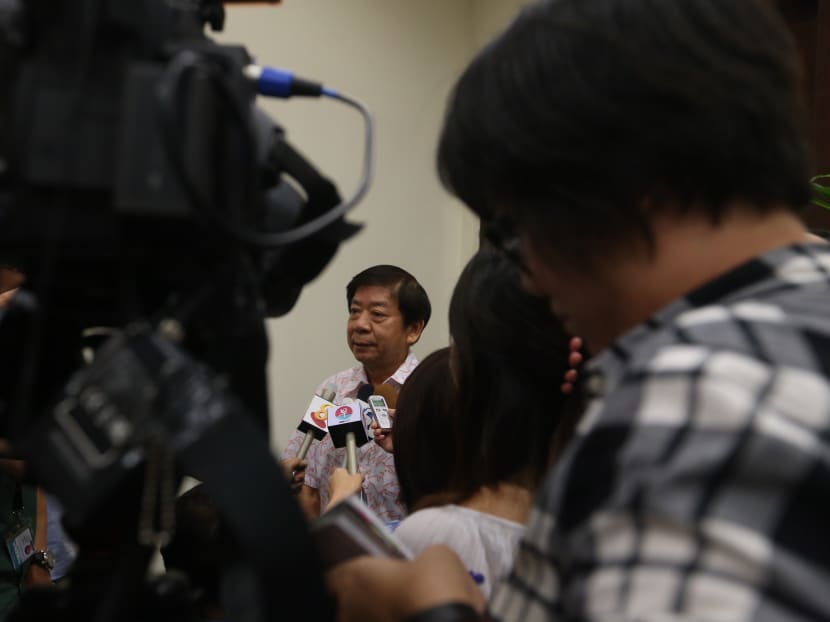Joo Koon train collision: Khaw chides signalling system provider Thales
SINGAPORE — Transport Minister Khaw Boon Wan on Tuesday (Nov 21) took Thales, the provider of the new signalling system, to task over the Joo Koon collision, saying it “could have done better”.

Transport Minister Khaw Boon Wan on Tuesday took Thales, the provider of the new signalling system, to task over the Joo Koon collision, saying it “could have done better”. Photo: Koh Mui Fong/TODAY
SINGAPORE — Transport Minister Khaw Boon Wan on Tuesday (Nov 21) took Thales, the provider of the new signalling system, to task over the Joo Koon collision, saying it “could have done better”.
His comments came as the French company took full responsibility and apologised for last week’s incident.
Speaking to reporters after a press conference to provide updates on investigations, Mr Khaw noted the “very challenging” situations faced by the company in running two different signalling systems on the East-West Line and the Tuas West Extension.
“When we launched the Tuas West Extension we intended it to be a seamless service... on hindsight, of course, this introduced a lot of complications... but still, Thales could have done better,” said Mr Khaw. “They have now acknowledged their mistake, they have apologised. So I decided, I’m going to end their misery — we just keep this complete separation so you’ve a clean system.”
This “separation” — the East-West Line from Pasir Ris to Joo Koon would run on the old signalling system, while the Tuas West extension stretch from Gul Circle to Tuas Link would continue on the new one — was to have been achieved by a month-long suspension of train services between the Joo Koon and Gul Circle stations.
On Tuesday, however, it was announced that the suspension would remain until the East-West Line re-signalling project is completed. The deadline for the completion will, meanwhile, be brought forward from the end of next year to June 2018. To speed up work, early closures and late start times for about half of the East West Line will begin next month, including full-day shutdowns on Dec 10 and 17.
Mr Khaw said: “But we’ll try to do this, speed up the complete resignalling of the East-West Line and that’s why I need more engineering hours for various other reasons as well. So to get it going quickly, we’ve decided on the schedule ... and I hope commuters will be understanding. We will make sure that (at) the affected stretches, there’ll be enough buses so that there’ll be good replacement of the capacity.”
On whether the Government will be seeking any compensation from Thales, Mr Khaw said there will be “contractual obligations”, but he would leave this to the Land Transport Authority (LTA). “My priority is to get this thing over with,” said Mr Khaw, adding that SMRT and the government can now go back to “our original job, which is to raise reliability”.
The collision is the second recent incident where Thales has come up short. On June 28, there were rush-hour delays on the North-South Line and Tuas West Extension after a team from Thales missed a step, which led to all trains on both lines losing communications.
LTA chief executive Ngien Hoon Ping said the agency had “taken note of the two incidents”, but said more investigations would have to be carried out.
On Tuesday, Mr Khaw, responding to reporters’ questions on whether the collision would affect public confidence in the new signalling system, said: “Of course, inevitably, the confidence will be shattered by events like this. But it (has) happened ... so we just have to get over it and regain the public confidence, which means back to the same old job. We’ve to raise reliability. As I told Singaporeans before, this is a multi-year effort.”
He noted that notwithstanding the collision and the flooding incident, “we were actually making good progress”. He added: “I gave myself four years, we’re halfway through... We’ll wrap up the (upgrading of the signalling system on the) North-South Line and speed up implementation of (the new system on) the East-West Line, so that the improvement in reliability can be more visible to the commuters. I am confident.”
At the press conference, Thales representatives said the company took “full responsibility” for the collision. Speaking to reporters later, Mr Millar Crawford, its executive vice-president for ground transportation systems, said: “I would like to take this opportunity to first of all, apologise to the commuters whose travel was disrupted as a result of the accident at the Joo Koon (station).”
In particular, he apologised to the injured commuters, and wished them a speedy recovery. “We’ve been fully cooperating in the investigation with SMRT and LTA,” said Mr Crawford, adding that the company has pooled its resources from around the world to look into what happened.
“Our global experts have examined this, and we’ve already identified some additional precautions to improve and guarantee the safety,” he said. “What that means is that from a Thales point of view, we absolutely guarantee 100 per cent the safety and integrity of the (system).”









